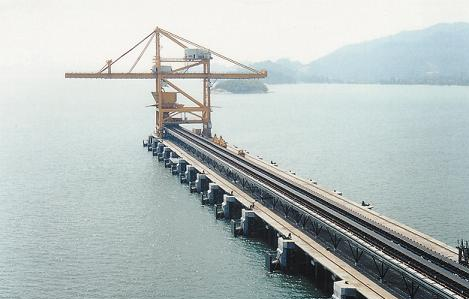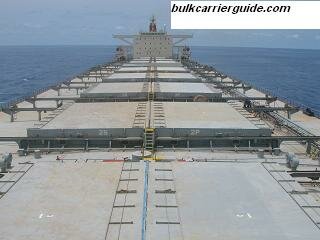

Home ||| Bulk Cargo ||| Planning ||| Care ||| Safety||| Self unloaders
Responsibility of terminal operator for bulk cargo loading/unloading

What is a bulk terminal ?: "Terminal" means any fixed, floating or mobile facility equipped and used for the loading and/or unloading of bulk cargo. The term includes that part of a dock, pier, berth, jetty, quay, wharf or similar structure at which a ship may tie up.
Terminal operators should ensure that they only accept ships that can safely berth alongside their installation, taking into consideration issues such as:
i) water depth at the berth;
ii) maximum size of the ship;

Fig: bulk terminal awaiting employment
iii) mooring arrangements;
iv) fendering;
v) safe access;
vi)obstructions to loading/unloading operations.
vii) Tidal situation for the period concerned.
viii) Weather forecasts.
ix) Whether ship will berth port or starboard sideto.
x) Tug and line boat requirements.
xi) Mooring requirements taking into account:
xii) The size and type of ship;
xiii)Local tidal conditions and foreseeable weather conditions;
xiv) The nature of the cargo and ballasting operations;
xv) Any obstructions to berthing/unberthing operations.
xvi)The terminal operator should assure an unobstructed and safe passage between the ship's gangway and the entrance (gate) of the terminal.

Vacuators are used to discharge bulk grains where the terminal is not fitted with other facilities. They use diesel motors to generate suction on one end so that the cargo can be discharged on a barge, rail wagon or maybe into a wing attached to a bagging machine. Their discharge rates vary upwards from 100 tonnes per hour.
When using vacuators on a ship they must be placed on deck, where special precautions may be required due to vibration and possible oil leakage. While adequate securing/lashing will ensure protection from movement, vigilant monitoring is required to ensure that there is no leakage of oil on deck.
Related Information
Suitability of Shore Terminals for handling bulk cargo
Responsibility of terminal representative for handling bulk cargo
Cargo information required by ships handling bulk cargo
Terminal information required by ships handling bulk cargo
Preparation and Guidelines for terminal prior to bulk cargo loading/unloading in ships
Terminal duties in loading solid bulk cargo
Terminal duties unloading solid bulk cargo
Training requirement for terminal personnel
Encountering hazards at the ship/shore interface during handling of Solid Bulk Cargoes
Required information from ship to terminal prior loading / unloading bulk cargo
High loading rates by shore terminal and potential problems for bulk carriers
Preparation for ships carrying bulk cargo & standard loading condition
Our detail pages illustrated many safety aspects of Bulk carrier
Home page |||Bulk carrier types ||| Handling of bulk coal |||Cargo planning ||| Carriage of grain |||Risk of iron ores |||Self unloading bulk carriers |||Care of cargo & vessel |||Cargoes that may liquefy |||Suitability of ships |||Terminal guideline |||Hold cleaning |||Cargo cranes |||Ballast handling procedure |||Bulk carrier safety |||Fire fighting systems |||Bulk carrier General arrangement

Operation of sea going bulk carriers involved numerous hazards . Careful planning and exercising due caution for all critical shipboard matters are important . This site is a quick reference to international shipping community with guidance and information on the loading and discharging of modern bulk carriers so as to remain within the limitations as specified by the classification society.
It is vital to reduce the likelihood of over-stressing the ship's structure and also complying with all essential safety measures for a safe passage at sea. Our detail pages contain various bulk carrier related topics that might be useful for people working on board and those who working ashore in the terminal. For any remarks please Contact us
Copyright © 2010 bulkcarrierguide.com All rights reserved.
Although every effort have been taken to improve the accuracy of content provided the publisher of this website cannot take responsibility for errors. Disclaimer Privacy policy Home page


